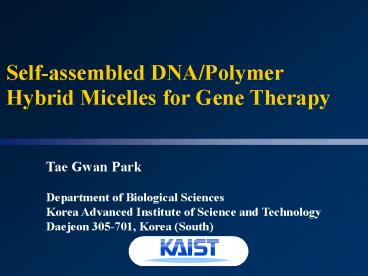Gene Delivery - PowerPoint PPT Presentation
1 / 25
Title:
Gene Delivery
Description:
Korea Advanced Institute of Science and Technology. Daejeon 305-701, ... At the most basic level, gene therapy can be described as ... Adenovirus. Herpes ... – PowerPoint PPT presentation
Number of Views:1813
Avg rating:5.0/5.0
Title: Gene Delivery
1
Self-assembled DNA/Polymer Hybrid Micelles for
Gene Therapy
Tae Gwan Park Department of Biological
Sciences Korea Advanced Institute of Science and
Technology Daejeon 305-701, Korea (South)
2
Overview of Gene Therapy
Polymer Gene Carriers
Target Delivery of Anti-sense ODN
Delivery Strategies of siRNA
3
What Is Gene Therapy?
At the most basic level, gene therapy can be
described as the intracellular delivery of
genetic material to generate a therapeutic effect
by correcting an existing abnormality or
providing cells with a new function.
4
Gene Therapy
Transfection
- A collection of approaches for the treatment of
human disease that rely on the transfer of
DNA-based genetic material into an individual - Prevention or cure of cancer, genetic diseases,
and infectious diseases
5
Application of Gene Therapy
Inherited Disease
Acquired Disease
Initially, inherited genetic disorders were the
main focus but now a wide range of diseases,
including cancer, cardiovascular disease,
neurodegenerative disorders, infectious diseases
and other acquired diseases are being considered
as targets.
6
Gene Therapy Approaches
1. Therapeutic gene based
2. Cell based-Transplanted with stem cells
or genetic engineered cells
3. Tissue/organ based- Transplanted with genetic
differentiated,or engineered tissue or organs.
7
Gene Therapy Mechanisms
6. Instill a specified sensitivity to a normally
inert prodrug
5. Interfere with the life cycle of infectious
diseases
1. Correct a mutated gene
Gene Therapy
4. Block the target gene expression to restore
cell or tissue functions
2. Replace a defective or missing gene
3. Augment the functions of the gene present
8
Gene Therapy Versus Conventional Therapy
9
Gene Therapy Strategies
10
Is Gene Therapy Easy?
?
Therapeutic Gene
Successful
The Answer Is NO
11
Intracellular Pathway
Three barriers of gene delivery
Cell Membrane Endosomal membrane Nuclear
membrane
12
In Vitro Vs In Vivo Delivery
13
Barriers Of Gene Delivery
14
Gene Carrier Systems
- Viral Vectors Non-viral Vectors
- Retroviral Vectors -Naked DNA
- Lentiviral Vectors -Lipoplex
- Adenoviral Vectors -Polyplex
- AAV -Lipopolyplex
- HSV Vectors
15
Gene Carrier/Gene Vector
Generally, viral vector system show higher gene
transfer efficiency than non-viral gene carrier
system, but viral systems have potential risk of
wild type virus regeneration, immunogenecity and
cancer formation.
16
The chill set in on 17 September 1999. That's
when Jesse Gelsinger, a young volunteer, died in
a gene therapy trial at the University of
Pennsylvania in Philadelphia, triggering a blitz
of media and government attention. The Food and
Drug Administration (FDA) has issued Penn a
warning letter and shut down all clinical trials
at Penn's Institute for Human Gene Therapy while
it investigates what happened.
Conclusions The safety of application of Ad
viral vector for gene delivery is still not sure.
17
(No Transcript)
18
Gene Carrier Human Application Considerations
Specificity
Only desired cells or tissue Be Delivered.
The delivery efficiency Dependent on the disease
requirements
Effective
Biocompatible Non-cytotoxicity Non-immunogenecity
Non-inflammation Non-Tumor Generation
Safety
19
Alternative Tools of Gene Delivery
Synthetic Vector System Polymer gene carriers
20
Protocols by Vector
21
Gene Therapy Safer and Virus-Free?
- New vectors for gene therapy aim to mimic viral
vectors pros without their dangerous cons - Science 294 1638, 2001, November
22
Gene Delivery without Viruses
- Non-viral methods represent only a fraction of
the gene delivery field but they are catching up
with viral vectors - C EN, November 26, 2001
23
Why Non-Viral Polymer Gene Carriers?
- Versatile design
- No integration into host chromosome
- Non-immunogenic and non-toxic
- Possible multiple and repeated injections
- Well-characterized and reproducible
pharmaceutical products - Simple and less expensive GMP production
24
Gene Delivery Pathways
DNA Complex
Endocytosis
Endosome
Endosomal Release
Nucleus
Nuclear Trafficking
25
Complex Formation of a Polymer and a Plasmid DNA
DNA
Ligand Polycation
DNA Complex































